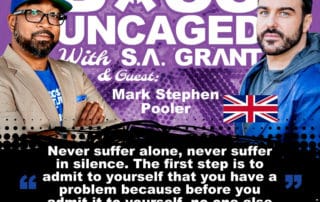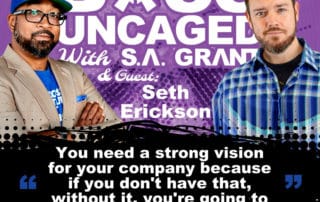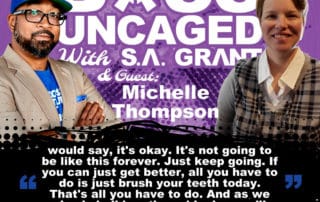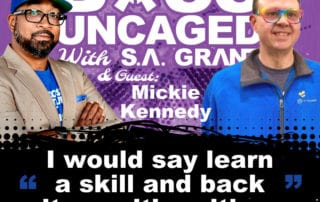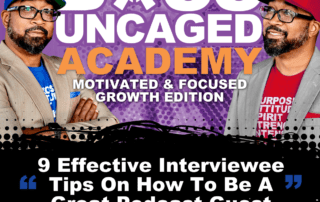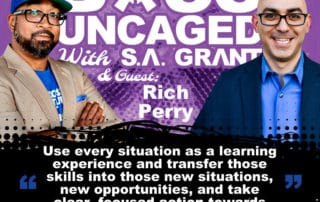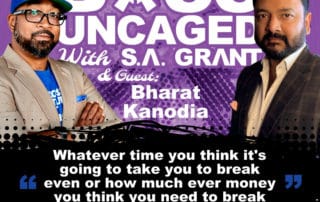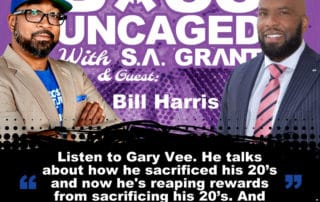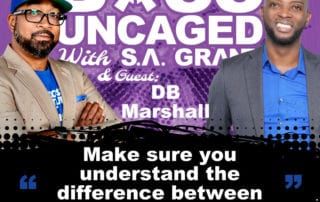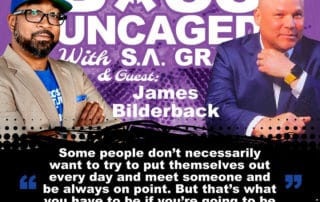Founder, Editor In Chief Of TMSP Agency & MSP News Global: Mark Stephen Pooler AKA The Press Boss – S2E54 (#82)
Boss Uncaged Podcast Overview
- What can Mark do for your brand?
- How Mark bounced backed after hardship
- Mark’s words to his younger self
- And So Much More!!!
Boss Uncaged Podcast Transcript
S2E54 Mark Pooler.m4a – powered by Happy Scribe
Okay. Alright. Three, two, one. Welcome. Welcome back to Boston Cage podcast on Today’s show. We have a special guest way way on the other side of the world from UK coming to us live and direct Mark. So I’m going to name you Mark. I always give my guest kind of a nickname. And because of the topic we’re going to be talking about, I’m going to name you the press boss. And obviously you’re going to tell people a little bit more while I’m calling you to Press boss right now, who are you?
My name is Mark. Steven Pooler essay, and I’m known as a global profile builder. I’m really happy with the name you have given me as well as the press boss. I quite like that one. And I’m a PR expert essay, and I support high profile, high value individuals to be seen, heard and get noticed with worldwide digital media to become known globe believe.
A lot of weight on your shoulders to say the lease, right. So if you could define yourself in three to five words, what words would you choose for yourself?
Three to five words to define myself? I would say honest, trusting, loyal, resilient and hardworking.
I think the person that you may go hand in hand with PR. So let’s dive into like, er, a little bit because obviously there’s multi different levels of PR and there’s press kits and there’s e releases and you’re talking about on a global scale, not just a localized scale. So kind of just tell us a little bit more about that PR thing that you specialize in.
What I do for my clients. Say, I helped my clients to build credibility and authority really, really quickly. Just a few years ago, I had no profile. I had to make a name for myself, and I made a lot of mistakes. I spoke all over the UK for free to build my profile. And it can be a really, really hard journey. And that what gives me pleasure. Now, looking after my clients, I can help them to build their brand visibility really, really quickly. I help them with written credibility articles, expert positioned radio and Web TV interviews and also press release and major publication features.
So I help them to gain brand exposure. Brand visibility that leads to building that leads to attracting clients and also a great, great benefit to what I do as well is really helping my clients to dominate Google Page, one of Google, also Google News and also YouTube as well. What I always tell my clients as well. And a lot of clients do ask what is PR and I misunderstood in many different ways. I always say to my clients what PR will do for you. It will give you the brand visibility and exposure very, very quickly.
And it also gives you third party credibility. So rather than you singing your praises and selfpromoting, it’s a third party singing your as for you. Also, it gives you celebrity endorsement because a lot of my clients want positioning so I can position them next to brand leaders, some of the biggest names in business, personal development and celebrities as well. So you are piggybacking off news outlets that have had many years to build their reputation. So it allows you to build your reputation really, really quickly. Also, the Google footprint is really, really important.
If you’re out there and wanting to attract opportunities, anyone looking at your name or business name, you need to be searchable on Google. And when people are looking to give you a job opportunities, speaking opportunities, they will Google your name. And I always am very honest about what PR isn’t as well. If my clients are coming to me and saying, I want hundreds of people to sign up to my email list, or I want hundreds of people to join my program, I would say that is the wrong approach to look at PR.
Go down the route of Facebook ads with conversion ads. If that’s the kind of thing you’re looking to achieve, what PR does do, it gives that trust, which does over time leading to attracting clients. And it gives you that social media presence and great tools to use on social media to share with your own platforms, share with your email list, share with your network. And that is what PR is.
So we can dive into that a little bit. And I think you gave a very detailed definition of what PR is. So let’s structure it a little bit. Right. So if I’m coming to you and I’m saying, hey, I need some PR. Majority of people may think that you’re just going to pretty much write a Press kit and that press it could be for a new product or a new service, but that’s not exactly how you do it. How does your business actually take someone to say, a speaker, a motivational speaker, and give them a body of work to then imply that in an environment that PR could be useful.
So Firstly, there are a few things that I need from the client in order for them to be PR ready. So it’s important that they have professional photos so that they look professional because it’s my reputation as well. And once they have professional photos, I would also need either a short or long bio. Also, they would need some kind of website don’t overthink this part, though, because many clients hold back on having PR because they don’t think their website is ready as long as the messaging is good.
And you have a basic website that has some kind of gift or some kind of sign up page that is efficient. So don’t overthink that part of the process. Just a basic website. So they need photos, the basic website, a short and long bio. Once they have some kind of product or service or launch, that is a great time for them to come to me to get the coverage that they require. You don’t need a product or service. You may have a story or a story or something, a message that you want the world to know about.
So it’s not only for products and services, but that is mostly what clients do come because they have a product service or a launch that they want to promote. And then we can get working on building their global profile. So I would do things like interview them on radio or outsource them to radio and podcasters to get let them see, noticed and heard the way I do the radio interview. It’s really done in a way to spotlight them and their success and to really talk to their target audience.
So then the radio interview is not something they just share once it’s something that they can reshare many times on their platforms to their email list and add to their website so that it’s talking to their target audience. So it becomes a marketing piece. The radio interview then is ranked on Google, so it’s giving them that Google search ability. I would then take them and do some press or major publication features. Now I have my own publishing platform, MSP News global. Com, and that is a real great site to posit in people because I’ve got some of the biggest names in business, personal development and celebrities.
So I can then publish their articles next to these leaders and then they have got great tools again to share on all of their platforms, showing them next to those celebrities and big leaders giving them that celebrity endorsement part. Credibility articles are really effective, and it also gives them those marketing tools to share. Again, my own platform has around over 200,000 region, USA, Canada and the UK. Because of the promotions, the ads that I do to the site and also the press releases I do to the site.
I can also get them into hundreds of different publications depending on the clients budget and the clients need. So I outsource publications as well if they want more exposure. Another great tool. What I do for my clients. I’ll do the digital cover of MSP News Global, putting them on the cover of a global news outlet. So it looks really impressive as social proof, showing them on the cover of a business outlet, business magazine and then press release. They’re so effective. I will do a national press release that will then get release two places like Fox, NBC, ABC, CBS, affiliates, financial feeds, industry news sites and newspapers.
What makes my press release really unique? It also gets published to independent news platforms, on top of all those other places that I mentioned giving the press release even more visibility. Again, this gives my clients the you that they want. It gives them the brand, Association and credibility of piggybacking off those big names like Fox, NBC, ABC, CBS. It gives them the marketing tools. Another big advantage of a Press release SA the clients think can take advantage of logos like as seen on Fox, NBC, ABC, CBS that they can use on their marketing branding on website.
If they require the great thing about what I do, everything is done for the client. They don’t have to worry. They fill in a questionnaire, provide the photos and give me a little bit of their time for the radio interview. I promote it everywhere. The client has marketing tools to promote it. So in answer to your question, that is how I support my clients and give them that exposure really, really quickly. They build the exposure, build the credibility, the authority that leads to building trust that leads to building attracting clients.
It gives them the Google footprint. They dominate Google, and they’ve got hundreds of tools to really take advantage of on their social platforms as well.
I mean, that’s definitely some insightful in detail that I mean, especially the one stop shop for their marketing needs to kind of get them out and also to build trust with that. You kind of talked about celebrities. Is there any way that you can kind of name drop a couple of celebrities that you’ve worked with in the past?
I would love to. So I have been fortunate to have done media coverage and interviews on most of the original cast of The Secret Movie, which is the lower of a Traffic movie, which is really, really popular. So I have interviewed and an articles for Joe Voy. Tally is a very well known name. Dr. John D. Martini is a very well known name. Marie Diamond, Dennis Watley. I was really, really fortunate recently to have been gifted the opportunity to do an article for Ronda Burn, who is actually the person behind The Secret Book and The Secret Movie.
She has a Hollywood movie out at the moment that is quite recent. Anyone wanting to check out these publications can go to www. Dot. Msp. News global. Com. I’ve also done media for Forbes Roley, who is a very well known name in the USA. I’ve done PR and supported events like Grant Cardone Jack Canfield to help them promote their events. Also, another great name is Dale God Boldo, who has a great presence in the USA. In Hollywood, he was on the OJ Simpson documentary was like a series A in the USA is also heavily involved in the Mickey Mouse Club in the USA.
There’s just a few just to name drop for us.
Yes. I mean, I think definitely this is the time travel a little bit, right. So, I mean, obviously you’re established now you have access now you have all these systems in place and you have all these brand opportunities to help your clients. But where does your story start? Like, how did you even get into PR?
So I will go from the beginning, I was always a guy at school that got bullied about the way I looked and also about my sexuality, even at first school essay before I knew my own sexuality. So every day for me was big in big years. Guy, you name it. I was called it. That led to me not taking great care at school and learning. I started to play out because of my low self esteem, my low insecurities. I left school at the age of 15 with a really bad education and I started drug taking.
It started with soft drugs to start with things like cannabis amphetamine. By the age of 21, I was addicted to crack cocaine and heroin. I went out on a part in I Take with friends, tried a new clubbing drug having the time of my life. 1 minute. The next minute I woke up in hospital, I had just collapsed and died. Bruises all at my arm where adrenaline had been pumped into me to bring me back to life. A shaven chest where shop pads had been used on me.
I was living a bad life that was going nowhere. I always was a worker throughout my addiction and I worked in top name hair. So here in the UK. So I was used to dealing with celebrities from a young age as a hair stylist because of the salons that I worked in, but my addiction was out of control. So I just like to share. That’s why I always say to my audience, fans, clients, friends, my network. It doesn’t matter where you are. It doesn’t matter if your past or present circumstances, you can create a whole new reality.
It starts with having positive empowering, belief systems, making great choices, repetition and action. Any new reality can be created so fast. Forward to my early 30s, I had had enough of working for other people, making loads of money for them and not making a lot of money for myself. And I set up as a freelance hair stylist. That was the start of my entrepreneurship journey. I then joined the network marketing company for two years. That was really the start of me working on my beliefs, working on personal development and self improvement.
I learned great skills like branding, building your network, social media entrepreneurship and I built a team of 50 recruited into six different countries. I wasn’t following my passion essay. I used to watch the motivation or inspirational speakers on stage at network marketing events and I thought that’s what I want to do. I want to share my story and inspire others. So I left network marketing around four years ago and jumped in the deep end to become a public speaker. I spoke all over the U, released my first book, Tips to Create the Life You Desire.
I then released my second book, which became a best seller in the UK, USA and Canada. And that was called Step Into Your Brilliance, which is an entrepreneurship guide for those that would like to speak, using the power of positive storytelling and social media to position themselves as an expert. I spoke on the same stage as Jack Canfield in Toronto. And then I was interviewed on a radio show in the USA, and it was to an audience of 3 million. And then they asked me to co host the show.
That was only around two and a half years ago, and that really put me into the spotlighting to what I do today with press media. And and it’s been a great journey over two years, I’ve launched an agency, Temp Agency, which is a premium media and PR agency, and launched MSP. News Global. Com. So within two years, say, I’ve really created a great, great platform for me to serve others and help them build their global profiles.
Yeah. I think it’s definitely a hell of a story and kind of like the near death experiences and anybody that I’ve interviewed and including myself, when you have a near death experience, it kind of changes you dynamically, like whatever you were doing before that near death experience and what you did afterwards, it’s kind of like that is the real start. The real you, the new you comes out of that. Once you recover from whatever it was that happened, you become a greater person. You become more insightful and you want to give back, and then you challenge yourself more and you become more streamlined.
So I definitely commend you on that journey from getting from being addicted to particular drugs and then becoming the success that you are currently. So think about it from the standpoint of somebody looking in. They’re listening to this podcast, the hearing you speak, and they’re like, wow, this guy recovered from drugs. He figured things out. He started a company and the perception is kind of like it’s an overnight success. But in the reality, how long did this journey really take you to get to currently where you are?
So the age of 21 was when I really started to use the thoughts in my mind. I read my first Law of Attraction book, but I was just working as a freelance hairdresser. I would say wasn’t until the age of 31, I really started to work on myself and my own personal development. So in answer to your question, I feel the bigger turning point in my social media entrepreneurship journey has been around the last six years. So anyone looking at me, no. Seeing all the success I’m creating, it has been a really hard journey.
For the first couple of years, I didn’t make any money. I put a smile on my face, kept showing up with determination. It’s been six years essay. But also, I still feel like this is just the start. I still feel like I’ve still got such a long way to grow myself as well. Yeah.
Yeah, definitely. I think the fact that you figured it out early enough and it’s kind of like, goes back to the statement is usually made. Most millionaires are essentially made in their 40s and 50s, and you’re at that cost before that age group. Right. So you’re kind of figuring it out a lot earlier. Even though you made mistakes earlier on, you had enough time to fix those mistakes, correct things and getting alignment to that way. You’re in a Bull market and you’re running north and everything you do from this point on, it’s just essentially growth strategy at 100%.
Oh, I was just going to say I’m 40 in September this year. So what you have just said is great. And don’t tell anyone I’m 40, though. It’s a big one, which I’m dreading.
It’s not that bad, man. I just turned 41 last year, so it’s not that bad.
I’m quite looking forward to 40, actually, I think in your 30s, you’re a little bit better than your 20s, a little bit more creating success. But I feel my 40s can be one of the best decades ever. I am active. Hi, Eli. Sorry, kids in embracing the time. Just hiking.
Yeah, I can see that. I can see that definitely in you. So let’s just say, hear me for a minute. If you could time travel backwards and change one thing on that journey, what’s that one thing that you would want to change if you could do it all over again.
I would say if I could change one thing, it would be believing in myself because as a 21 year old, I didn’t have those belief systems. I didn’t have that mindset. And I was insecure about the way I looked when, in fact, I didn’t look that bad. But all those years of being bullied, it was like the scars are healed, but the wounds were very much still there. If I’ve said that correctly, and I didn’t have that belief in myself, and I didn’t feel good enough. So it would definitely be to believe I’m good enough just the way I am.
Wow.
Wow. Definitely powerful stuff. So, I mean, obviously, you have tenacity. You have the hustle of a Fortune 500 executive. Like, does this come from an entrepreneurial background? Anybody in your family kind of led you in this direction, Mo.
Close relatives. To be honest with you, I’ve always been really, really hard workers. So my mom always worked as a nurse. My dad always worked as a painter and decorator. My stepdad’s a painter and decorator as well. And I did have an uncle who was really successful, made a lot of money, very entrepreneurial. I’ve also got a cousin who’s made it chameleons, who was very entrepreneurial. But I would say no, my family really never had loads of money, but they always had really good, strong work ethics that were serving others.
So I would say no, say they’ve always a great worth ethics, but not really entrepreneurial. They’ve always been about service and working really, really hard to make ends meet.
Interesting. So let’s fast forward to today. Right now you have things rolling. Everything you’re doing is growing and is multiplying. But how do you currently juggle your work life with your family life?
This is a good question, actually. Essay. And it’s really important to get this balance correct. And I would say it’s only the last twelve months when we hit the global pandemic, I realized that I wasn’t getting the work life balance correct. So I was just building, building, doing all the work focused on business. But I wasn’t really taking time for myself. It’s really important to get that balance right. So what I do, you know, most of the time weekends, I take off Saturdays and Sundays on my free time to get that balance correct.
Spending time with family members, friends, close relatives is really, really important. You can’t create success that will be lasting. Just getting that balance wrong. You really have to do make sure you’re looking after your health. Wellbeing, family, friends, business, make sure you’ve got that balance right. And I feel the global pandemic through all the negative that it’s creative. I do feel there’ve been a lot of blessings as well to really look after our time. It’s so important. Slow down a little bit. You will get to where you want to by slowing down just that little bit and taking time for yourself as well.
Wow. Definitely. Definitely powerful, powerful, powerful insights. So let’s talk about your morning ritual, your morning habits. Do you have any in a socially like, what time do you usually start up to start those rituals?
So a sweet spot for me is around 07:30 a.m. To quarter to 08:00 a.m.. I find when I get up at that time, I get a lot of work done really early, giving me more free time in the evening. My records that are really important to me. As soon as I wake up, I put in an audio and meditate for around 20 to 30 minutes using selfhypnosis. I also use a great technology called Hemi sync, where it syncs the two parts of your mind together so that you think better.
So that’s my first ritual that if I don’t do it, I don’t get as good results. I don’t feel as good and I don’t show up as well in the world. So first is meditation on an evening gratitude. Before I’m falling to sleep, I go through all the things in the day, even the little things like the air that I breathe, the shirt on my back. I go through all of my gratitude for the day. Also, visualization. I do bits of visualization. I don’t spend too much time in the future.
I let it go because everything happens in the present moment. So gratitude, visualization, meditation. Also, I do eat well, eating lots of Greens, drinking fresh water. It’s important to think so important to put great things into the body because that is what is going to fuel you forwards and a little bit of exercise those on my things that are really important in my rituals.
Definitely. I’m just recapping what you said in my head, and it’s structured, but it’s organic in his nature, which kind of seems that fits your personality. And I can see kind of like in the morning you wake up and you do this and then after that, you’re blowing and it allows you to get through your day. And then in your evening time, that gives you enough time to kind of settle down and start over again. So I definitely like that because of this podcast, I had opportunity to create a book club.
So this is the question that I love asking because every answer will be uniquely different. And what motivated you on your journey could be something that could motivate someone else. So what books have you read that helps you get to where you are that you want to recommend. And what books are you currently reading or audio books, for that matter? So.
A book that changed my life has to be the Secret. There is a new version there, which is called The Greatest Secret. But even The Secret book is absolutely a life changer for the way you can create your own reality. It’s absolutely incredible. Another great book that has inspired me is Jack Canfield Success Principles. Very, very good book. And I’m more of an Audible audio guy. I prefer listening to books, and I haven’t read it yet, but I know it’s a fantastic one because I recently interviewed them on my television show is called Ask by Mark Victor Hanson and Crystal Dwyer Hanson.
And I am about to dig into that one very, very soon.
Nice. Nice. So where do you see yourself and your company? 20 years from now. So.
I have very, very big goal, I say. And I had dreams of being a sixfigure owner. And then as I grown, that went to being a millionaire. And then that went from being a millionaire to a multi millionaire. I have got huge, huge goals, a huge vision. And yes, they’re big. And to some people, they may not feel on, they might feel unbelievable. But I am about having huge visions and huge goals. So now my goal in 20 years, I have to look at visualizing a hundred million.
Why not? If not me, why not? Someone else got you. If not me, it could be someone else. So have big visions. And if you don’t reach it, at least you’ve had that vision and you’ll get close to even where you’ll get closer to where you want to be by having bigger visions.
Yeah, I definitely think. I mean, most people don’t realize that once you get to a certain point and you have things figured out, you have your systems in place and you’re not working harder. But things are working for you harder. Then you kind of could multiply. So like, your 100 million could easily be 2 billion. It’d just be a matter of five years from now. You may figure out some system or software that does what you do in addition to what you’re doing to where you can multiply that overnight and then you scale it and you’d be 100 millionaire in five years.
Correct. And also it does have to kind of feel believable to your own belief systems. So I’m not quite ready to visualize that millionaire billionaire status at the moment, but her 100 million, it can be achieved like you say, with the right systems, with the right team, with the right support and 20 years is a long time to get to that goal. Anything is possible.
Yeah. I like the fact that you just brother use like, it kind of goes back to the laws of attraction, the rules of attractions like you’re asking for the 100 million and you’re working towards 100 million. But you’re gonna shoot past that. But in reality, in the next 20 years, five years, that 100 million could easily scale to a billion, because then you’ll be ready to receive that billion versus now you’re not ready. So you have to put things in place to be able to receive that billion when that time comes.
So I definitely commend you for being well aware of where you are versus where you’re going to be.
Definitely.
So what schools or software do you use that you would not be able to do what you do currently without.
So I think tours are so, so important, and it takes a while to get the right systems in place. So I would say for me, things like my website is the biggest asset and tour, and it’s a great one. Msp. News global. Com. That is a great, great asset. My simple one page landing page is a brilliant tour with all my social media platforms. That’s contact Mark me. It’s got a schedule, your meeting, it’s got things like all my social media channels, my email contacts, and another great tour.
Also, my email list and a mail chimp is something that I use a lot. And that is something that I really, really couldn’t live without. Social media platforms are great, great tools. You put me on the spot here. I should have done a bit of research about all the tools I’ve used. I’ve gotten many, which I couldn’t live without, even things like Zoom five, which I really take advantage of. So to answer your question, there is a few, but there are lots more, which I just can’t think of right now.
Yeah. I think it’s funny that you brought that up because, I mean, a diversity in software in today’s world versus ten years 20 years ago is 90 day different. And there’s always, like, a lot of times I’ll think of something and I’m like, okay, let me see if this already exists before I try to create it so I can kind of get a leg up and nine out of ten times if I do the research. And if I play with the algorithms on Facebook, sure as hell there is a software to do that little thing, and there’s always that one little thing that you need, something created for that you’re not willing to put the effort to develop it for.
So I mean, to your point, there’s a million different softwares out there, and I think people need to understand the value of software could help you systematize what you’re doing to your point. To get to 100 million, I’ll get to a billion a lot faster.
Yes. And tools. I do use a lot, which I forgot to mention, and they are quite gamechanging. Some bots are incredible. Some engagement tools for social media I couldn’t live without as well. So some of these automation tools and engagement tools, they’re absolutely incredible and really help to scale and grow. Just as you mentioned, it definitely.
So let’s go into words of wisdom, right. And I think particularly for you, let’s just talk to an audience of 18 to 35 years old. They may be going through some life changing event. It may be drugs, it may be death. It may be. They hate their job, whatever it is that they’re going through, I want you to talk to them and give them some words of insights to push them from where they are to move forward and grow.
My word of wisdom would be never suffer alone, never suffer in silence. The first step is to admit yourself that you have a problem, because before you admit yourself before you admit it yourself, no one else will be able to support you. Reach out to a friend, a family member, a mentor, a teacher, someone that you can trust and confide in and never suffer alone. It doesn’t matter where you are now. It doesn’t matter where you have been in the past. Any future reality can be created with positive empowering, belief systems, making better choices, repetition, taking action, get it down on paper, write down your goals and take little steps every single day towards your end destination.
Don’t see a big mountain in front of you. Little tiny steps every day will get you to your goals.
Wow. Wow. I think you’re a living, breathing example of the laws of attraction. And it’s kind of like I think most people think in the laws of attraction, right? Is that you just have to think it and it becomes a reality. But I think they missed the one component of you have to take a lot of damn action and believe in yourself and do both of these things simultaneously to get the results that you’re looking for. So I think what you just said kind of gives a little bit insight to who you are as a person and who your company is going to represent as well.
In my next question, right?
Yes, I agree with that.
Great. So my next question is, who’s your target audience? I mean, kind of like price point wise, do you have different packages and what do those packages look like?
So my starting level that I work with clients is $500, and that would be for something like a radio interview and a Press release. My services go right up to $10,000. My medium package is around $3,000. So if there is someone out there that does want to be seen, heard and get noticed, it is around a minimum budget of $500, way up to the premium clients that I work with up to $10,000, my target audience and people that are a perfect fit for what I do would be bestselling authors or authors that want to become bestselling authors, real estate investors, real estate brokers, keynote speakers, inspirational speakers, coaches, creative entrepreneurs, but not just only those.
Because the PR I work with is business. It’s very, very broad. I have also done people in the medical industry artists. So if you have a business, I could support you. If you are in business. I do offer a free PR consultation, or people out there need to do if they’re ready and want to get seen, noticed and heard, and they have the budget of $500, they can schedule a free PR consultation at www. Contact. Mark me that’s contact Mark me and they can just schedule a meeting.
And Al most social media platforms are there as well. If people would like to connect with me on social.
Yeah, I think definitely. I mean, I’m just recapping what you said in my head. And one thing that that stood out to me because obviously we’re in the marketing space, we’re in the broadcasting and podcasting. And a lot of times people are always trying to figure out how to monetize a podcast. So one thing that you said for the $500 gives you opportunity to do some promotions, but also do live radio is that live radio considered to be like a podcast. And is that an alternative way of monetizing podcast?
The radio network that I am on is Web radio. It’s on the Business Innovators Radio Network, which is a USA based radio network, and it gets syndicated to all the hot radio block, talk radio, Spreaker, YouTube. If my clients did want a real radio on FM radio, I can outsource that and have many contacts who would happily have you on their shows as well. Also, my TV show is on the E 360 TV Network, which gets broadcast to Rocko, Apple, TV, Fire TV, Android TV, and many, many more.
It goes across all social platforms that has an estimated reach of it gets to millions of homes, up to billions of OEMs. It’s on millions and millions of devices. So if people are looking for exposure, I can support them with their needs, their requirements either on my own shows, my own platforms or other people’s platforms as well.
Wow. Wow. So I think with the TV side of things, I mean, considering that you only been in this space for, like, less than a decade, like somebody may be asking, like, how the hell did you have opportunity to create your own TV station? Like, what was the journey would that look like?
So it was me first having the radio show growing the radio show, then it was building my publishing platform, MSP. News global. Com. It’s not my television network. I have a show on there, and I will then introduce to host a show on that network in 360 TV. The show is called Brilliance Business TV. It can be viewed at MSP. News global. Com as well. Just go to the section what says TV and you’ll find all my TV interviews there as well.
Wow. Wow. Definitely. So, I mean, you kind of put a couple addresses out there. How can people find you on social media? Like, what’s your handle?
The best way for people to find me on social media is www. Contact Mark May Gotcha.
So you have essentially, it looks like it’s like a microsite landing page with all your links on there.
Yes, that’s correct.
They great. So let’s just go into some bonus questions, right. If you could spend 24 hours with anyone better alive, uninterrupted for those 24 hours, who would it be? And why?
That’s a big question. And there’s so many people that inspire me is the question that you think for sure it would have to be Oprah Winfrey purely because she’s a media mogul, and that’s something I’m passionate about. She’s also passionate on authors and books, which I’m passionate about. She’s a guru on television, which one day I hope to be at that level with her and just her story. She’s come from dreadful past and what she is achieved and how she serves others, it would have to be Oprah him three.
Yeah, definitely. I think anyone that’s in this space at one time or the other has to look to her as the pinnacle example of how you can go from being an underdog to being a champion, not of just yourself but champion of multiple diverse individuals. So I definitely appreciate that. So another bonus question for you, what is your most significant achievement to date?
I feel I’ve made a lot of progress just over the last six years. I’ve had lots of big achievements. I would say the biggest achievement to date is really making my business work and growing my own global platforms and creating my own global brand. The global Profile Builder with MSP. News global. Com really serving others? I really enjoy serving others. A no, I am fortunate to be doing that on bigger scale. And that was why I started this whole journey was to inspire people that you can create a future reality no matter of your past.
I’ve created that NEM and that’s my biggest achievement I can think of.
I think definitely. I mean, just having you on the show, and this is kind of one of the reasons why I have this podcast is to interview people like yourself. Kind of I have my own achievements. But then I listen to you, and I’m just like, there’s obviously more than I could be doing. So you definitely inspired me today. And I definitely appreciate you coming on the show. So in closing, I always give opportunity to whoever I’m interviewing opportunity to ask me any questions that may have come up during this particular episode.
I would say, Firstly, thank you so much for the opportunity. I’ve really enjoyed it. Your brilliant toast. You are great at asking questions. It flows so well. You have a great talent. I know you have your own amazing business supporting all your clients with your amazing systems tools, your shows. I haven’t got a question for you because you’re coming on to my radio so soon. So I’m really looking forward to having you in my hot seat as well. But I’m excited what we can achieve together. Essay because I think we’ve met for a reason, and I definitely am looking forward to future collaborations.
Yeah, definitely. I appreciate you stating that because I mean, I’m actually the more and more I listen to you, the more and more I hear your story, and that’s the beauty of the media circle that people don’t realize is that you have these opportunities to talk and conversate with someone. And then, like you said, I’ll be on your show. So there’s going to be things that we’re going to learn about each other on this journey as we cross reference and interview each other and make referrals and recommendations to each other to where it could be not only fruitful financially, but it’ll be fruitful internally as well.
So I definitely appreciate you coming on.
I really, really appreciate the opportunity. And this is just the beginning. I can definitely see lots of collaboration for the future.
Definitely. Definitely. Essay grant over and out.

